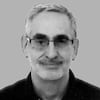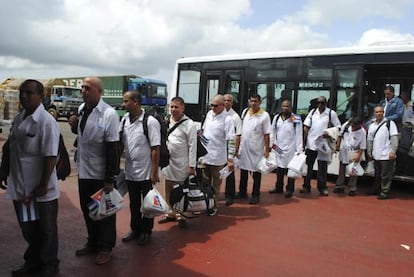Cuba pardons deserting doctors who applied for US parole program
Health workers will be welcomed back with jobs and will not face sanctions, says Raúl Castro


For months, the United States and Cuba have been trying to reach middle ground over a 2006 policy introduced by the George W. Bush administration, which encouraged Cuban physicians and health workers sent abroad to third countries to abandon their jobs and migrate to the United States.
The Cuban Medical Professional Parole Program created by the Republicans in 2006 has become one of the stumbling blocks in the ongoing talks between Washington and Havana aimed at normalizing diplomatic relations.
The Cuban Medical Professional Parole Program has become a stumbling block in talks between Washington and Havana
While President Barack Obama has slowed the process of granting visas under the program, Cuban President Raúl Castro has done his part by announcing last month that he will grant full amnesty to all returning medical professionals who deserted while stationed abroad.
Castro said they can safely return to Cuba, where they will be given jobs and will not face any type of punishment or sanctions.
Until now, deserters, whose medical licenses have been revoked, had been banned from returning to Cuba for seven years.
Many of these defectors were sent on humanitarian missions to Brazil, Venezuela and Bolivia, where the leftist governments in those countries had set up social health programs in poor neighborhoods.
Those who opted to apply for the Cuban Medical Professional Parole Program traveled to Colombia, where they waited for their US visas to be approved.
It is estimated that thousands of physicians, nurses and other medical professionals applied for the US program, which was aimed at weakening Cuba’s public health system.
There are around 400,000 health professionals serving the 11.5 million residents of Cuba. About 50,000 have been sent abroad to 68 countries under bilateral agreements.
In Cuba, which has one of the highest doctor-patient ratios in the world, there are 85,000 physicians – one for every 130 residents.
Physicians were attracted by the higher salaries offered through the medical missions set up by the Cuban government abroad. A doctor stationed in another country could earn up to $1,000 a month. By comparison, a doctor’s monthly wages on the island are around $60.
Cuban sources explained that the doctors who decide to return will not only be offered jobs but will also receive further training in different areas of specialization and be allowed to apply for scholarships and to participate in conferences in other countries.
English version by Martin Delfín.
Tu suscripción se está usando en otro dispositivo
¿Quieres añadir otro usuario a tu suscripción?
Si continúas leyendo en este dispositivo, no se podrá leer en el otro.
FlechaTu suscripción se está usando en otro dispositivo y solo puedes acceder a EL PAÍS desde un dispositivo a la vez.
Si quieres compartir tu cuenta, cambia tu suscripción a la modalidad Premium, así podrás añadir otro usuario. Cada uno accederá con su propia cuenta de email, lo que os permitirá personalizar vuestra experiencia en EL PAÍS.
¿Tienes una suscripción de empresa? Accede aquí para contratar más cuentas.
En el caso de no saber quién está usando tu cuenta, te recomendamos cambiar tu contraseña aquí.
Si decides continuar compartiendo tu cuenta, este mensaje se mostrará en tu dispositivo y en el de la otra persona que está usando tu cuenta de forma indefinida, afectando a tu experiencia de lectura. Puedes consultar aquí los términos y condiciones de la suscripción digital.








































